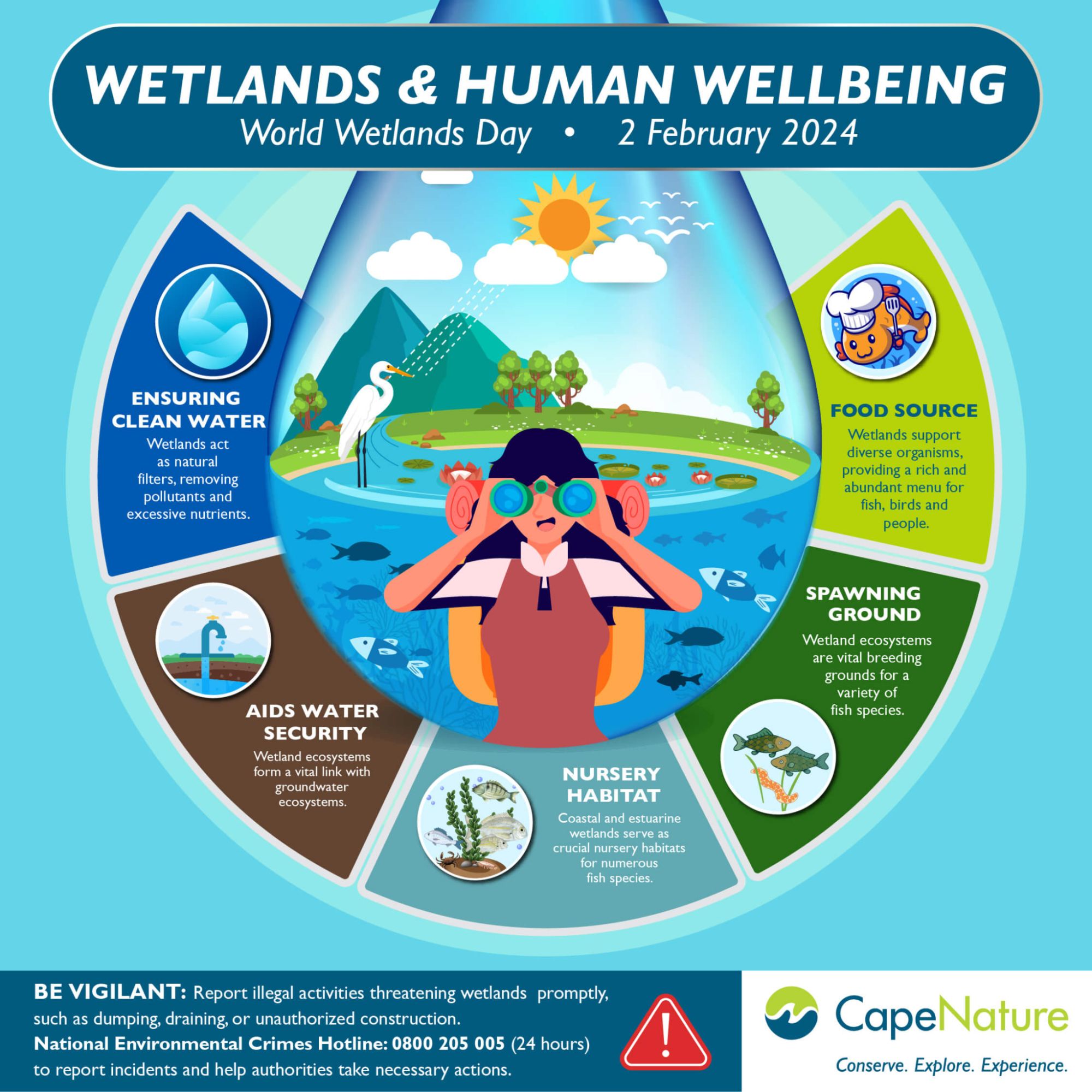CapeNature celebrates World Wetlands Day 2024
CapeNature, together with the Western Cape Department of Environmental Affairs and Development Planning, will celebrate World Wetlands Day at Assegaaibosch Nature Reserve on 2 February 2024. Grade six learners from Pniel Primary School will participate in an educational event aimed at fostering an understanding of the importance of wetlands, encouraging positive environmental behavioural change, and creating an opportunity for improved wellbeing.
World Wetlands Day, celebrated every year on 2 February, marks the signing of the Ramsar Convention on Wetlands, an intergovernmental treaty with the mission to conserve wetlands. This day is celebrated to raise public awareness about the importance and value of wetlands. The theme for 2024 is “Wetlands and Human Wellbeing”, which spotlights how all aspects of human wellbeing are tied to the health of the world’s wetlands — physically, mentally, and environmentally.
Studies repeatedly show that a connection with nature has a positive outcome for mental health. Meaningful moments in nature can help to reduce stress, anxiety, and fatigue; improve mood, energy levels and focus, strengthen our immune system and build psycho-social resilience. Some studies claim there is even an increase in life expectancy. Proximity to water also has a positive impact on wellbeing. These blue spaces, from catchment to coast, provide soothing sensory experiences and a sense of something greater than ourselves.

There are also various benefits associated with wetlands, which include environmental, economic, educational, societal, recreational, and aesthetic. Wetlands can contribute to improved water quality by the removal of pollutants from water through physical, chemical, and biological processes that take place in wetlands. Wetlands also assist with erosion control as the roots of wetland plants hold soil in place and can reduce the speed of stream and river currents. Wetlands reduce the impact of floods by soaking up and storing floodwater. Lastly, wetlands can positively impact the water supply, serving as reservoirs and releasing retained water into surface water and groundwater.
In addition to all these ecosystem services and benefits, wetlands are fun. They are a destination for outdoor activities such as hiking, fishing, bird watching, and photography.
“Our Department has prioritised wetlands as critical ecological infrastructure in the Province, which provide essential services to communities and our economy. We work closely with CapeNature and other partners, like Biosphere Reserves, to highlight the protection and rehabilitation of our wetlands. Part of this includes educational awareness around the value of wetlands and encouraging our youth to think about how wetlands actually make our planet more liveable.”
“By visiting a local wetland, such as Assegaaibosch Nature Reserve, situated in the Jonkershoek Valley near Stellenbosch we educate students on how wetlands provide a habitat for numerous species, are highly valuable biological assets, and help to mitigate the effects of climate change,” said Bredell.
“CapeNature is committed to providing outdoor educational experiences to children, including those who have never visited a nature reserve before. Our programme at Pniel Primary School is an opportunity to learn about wetlands, their conservation and how this benefits us. Learners will take part in a series of action-packed activities allowing them to enjoy the great outdoors, and wetlands in particular,”
The entity is offering facilitated curriculum-aligned wetland programmes during February. Teachers and parents are invited to email learning@capenature.co.za for more information. For relevant resources, visit the learning library on our website at www.capenature.co.za.
Related News
How can I assist you today?
How can I assist you today?



